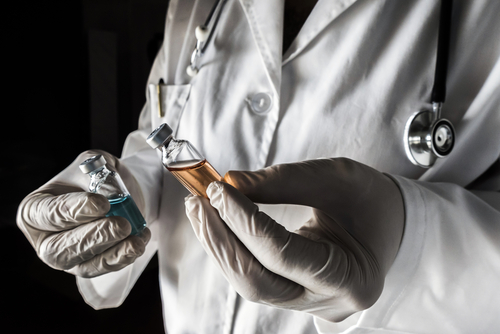A new formulation of CT-P13, a biosimilar of Remicade (infliximab), that is given as an under-the-skin (subcutaneous) injection, was shown to be as safe and effective in treating inflammatory bowel disease (IBD) as its first and approved intravenous infusion version.
CT-P13 IV (intravenous infliximab) is sold under the brand names Remsima and Inflectra. The subcutaneous version, should it be approved, is applicable for home use and self-administration.
Results from a Phase 1 trial (NCT02883452) showed that the new subcutaneous (SC) formulation of CT-P13 could ease disease activity and induce remission in people with ulcerative colitis and Crohn’s disease at similar rates to those treated by its IV form.
Trial findings were detailed in the study “Noninferiority of Novel Subcutaneous Infliximab (CT-P13) to Intravenous Infliximab (CT-P13) in Patients with Active Crohn’s Disease and Ulcerative Colitis: Week 30 Results from a Multicentre, Randomised Controlled Pivotal Trial,” presented at the United European Gastroenterology (UEG) Week 2019 in Barcelona.
A Phase 3 trial (NCT03945019) is now recruiting 600 people with moderately to severely active Crohn’s disease to further test CT-P13 SC, this time to show superiority against placebo. Rates of clinical remission after one year of treatment is this trial’s primary and sole goal. Enrollment information, possibly at a single Cincinnati, Ohio, site, is available here.
Remicade, by Janssen Immunology, is a synthetic antibody engineered to block the signals of the tumor necrosis factor alpha (TNFα) molecule, which are known to be important drivers of inflammation.
It is approved to treat a number of autoimmune disorders, including IBD, but is costly.
Celltrion Healthcare developed CT-P13 as a biosimilar to Remicade, meaning it holds similar safety and efficacy profiles as the branded reference therapy (has non-inferiority), but carries a lower price.
CT-P13 IV is approved by international regulatory agencies across some 110 countries, including the European Medicines Agency and the U.S. Food and Drug Administration.
Celltrion Healthcare is developing an under-the-skin CT-P13 formulation for greater convenience and ease of use.
“CT-P13 SC infliximab has the potential to become the most innovative biosimilar treatment — improving convenience and allowing patients to have more control of their treatment in addition to direct clinical benefits,” Stefan Schreiber, MD, director of the clinic for internal medicine at University Medical Center Schleswig Holstein in Germany and a study lead author, said in a press release.
The safety and efficacy of CT-P13 SC compared to CT-P13 IV was evaluated in the Phase 1 trial that enrolled 136 patients with moderately to severely active Crohn’s and ulcerative colitis.
Of these people, 66 were randomly assigned to CT-P13 SC injection at either 120 mg or 240 mg (depending of body weight; below or above 80 kg, about 175 pounds) every two weeks, and the other 65 to CT-P13 by IV infusion at5 mg/kg every eight weeks. Both groups received an initial loading dose by IV (5mg/kg) at the study’s start and week two.
Evaluation of the stability and behavior of the medicine inside the body showed that both versions CT-P13 had similar pharmacokinetic profiles after 22 weeks of treatment.
Further assessments found that CT-P13 SC was as effective at managing IBD symptoms as the IV formulation. In total, 44 of 66 patients (66.7%) treated with CT-P13 SC achieved clinical remission by week 30, as did 35 out of the 64 patients (54.7%) who finished in the CT-P13 IV group.
Data also showed that the two CT-P13 formulations were comparable in inducing bowel tissue healing by week 22. Mucosal healing at that same time point — measured by an SES-CD score of 2 or less in Crohn’s patients and a Mayo endoscopic subscore of 1 for ulcerative colitis — was achieved by 48.1% (26/54 patients) in the SC injection group and by 41.0% (16/39 patients) in those given the IV infusion.
The safety profile of the two formulations was similar. Fewer patients were found to have positive anti-drug-antibodies with CT-P13 SC compared to CT-P13 IV — 37.9% vs. 53.8% — by the trial’s end, researchers reported.
“It is anticipated that this novel formulation would facilitate and broaden access to efficacious and convenient therapy for the patients,” they concluded.
CT-P13 SC (to be sold as Remsima SC) was recently approved by the European Commission to treat rheumatoid arthritis, making it the world’s first subcutaneous formulation available of infliximab.
Celltrion has requested that its European label be extended to include people with IBD. A final EU decision is expected in mid-2020.
“A new subcutaneous formulation of infliximab has the potential to change the way patients manage their condition on a day-to-day basis, offering them greater choice and convenience in the long term,” Hyoung-Ki Kim, vice chairman at Celltrion Healthcare, said in the release.
“Furthermore, offering patients the option to self-administer will reduce demand on healthcare systems, by lessening patient time spent in hospitals, keeping patients out of clinics and providing clinicians with additional time to spend with other patients,” Kim added.

